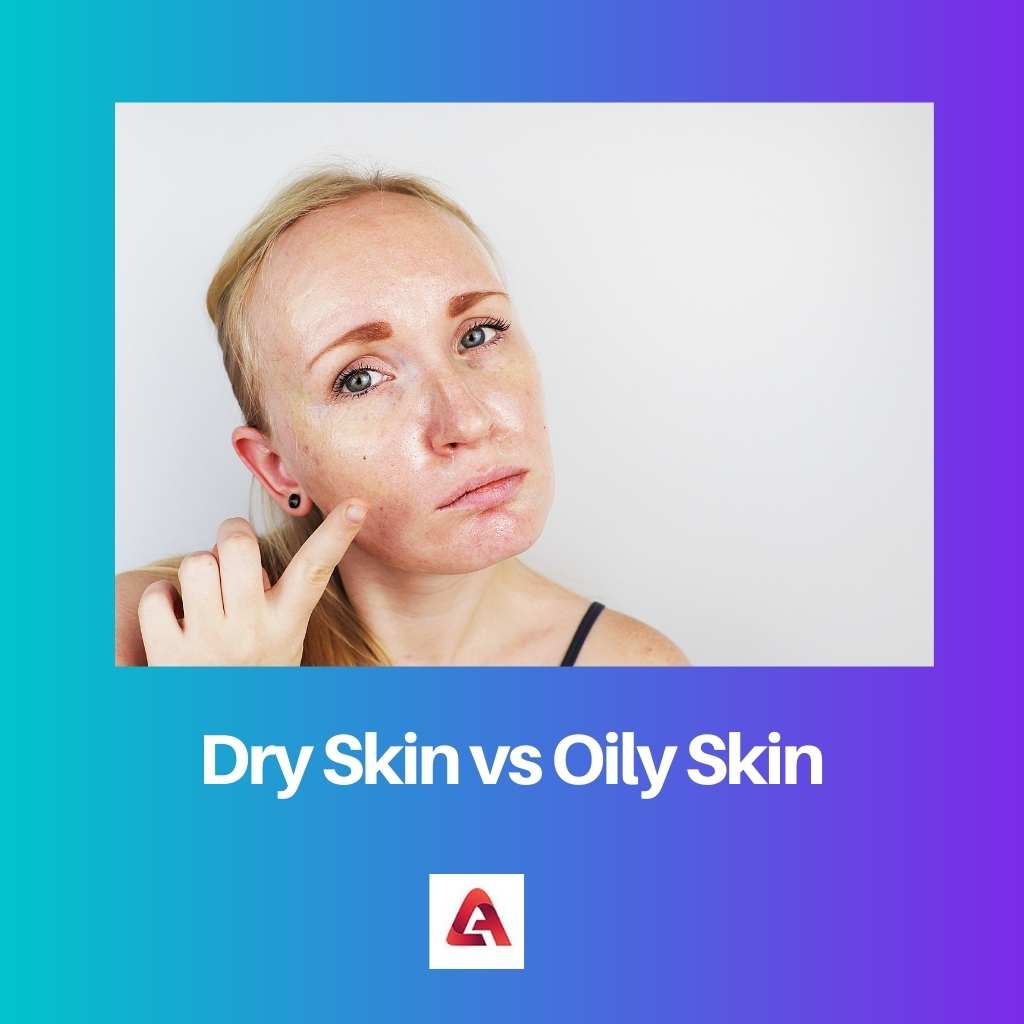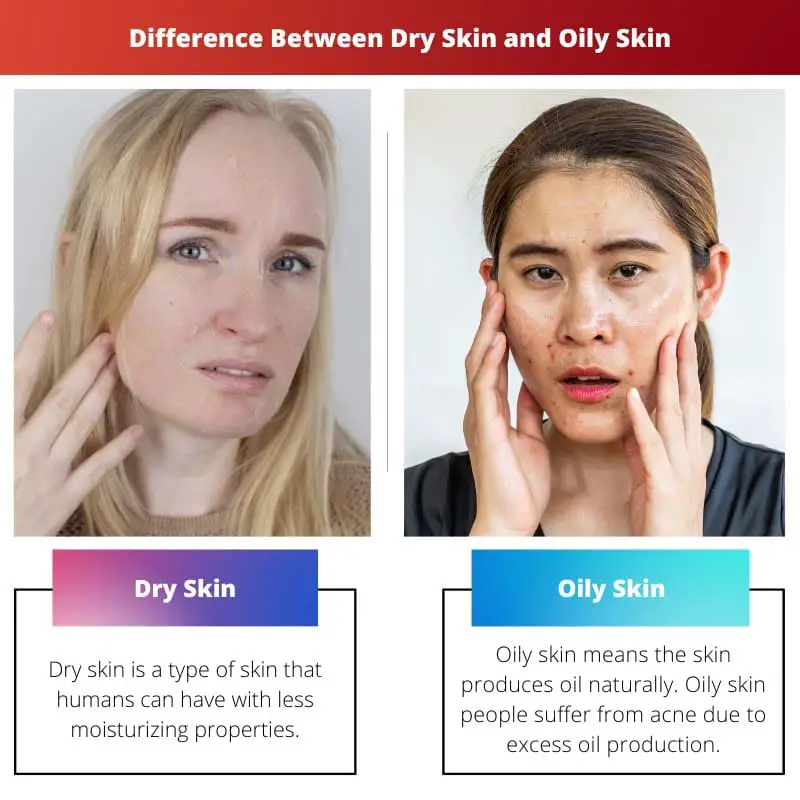Dry and oily skin types are different in various manners. Humans have either dry, combination, or oily skin. The texture of both oily and dry skin is different.
Oily-skinned people suffer from oil production regularly. On the other hand, dry-skinned people fear the production of flakes and dead cells on the top layer.
People with oily skin show better anti-ageing properties than dry skin people. The skincare regime is different for both oily and dry-skinned people.
Key Takeaways
- Dry skin lacks adequate moisture, leading to flakiness, itching, and tightness, while oily skin produces excess sebum, resulting in a shiny appearance and clogged pores.
- Dry skin is more prone to wrinkles and fine lines, whereas oily skin is more susceptible to acne and blackheads.
- Treatments for dry skin focus on hydration and barrier repair, while oily skin treatments aim to control sebum production and unclog pores.
Dry Skin vs Oily Skin
“Dry skin” refers to skin that lacks moisture and sebum, feeling tight and possibly showing visible flaking, it also looks rough and dull in texture. “Oily skin” is characterized by an overproduction of sebum making the skin look shiny and feel greasy. It is also prone to ance and clogged pores.

Dry-skin people require frequent moisturization. The natural moisture level in dry skin people is less. Dry skin is good for the summer months but not winter.
Skin care products for dry skin contain a high moisture level. Dry skin requires oil-based products to moisturise the skin.
Oily skin people require less moisturization. Everyone with oily skin should try water-based products, as oil-based products don’t suit well for oily skin.
People with oily skin would see good anti-ageing properties. The anti-ageing properties are due to the natural moisturization of oily skin.
Comparison Table
| Parameters of Comparison | Dry Skin | Oily Skin |
|---|---|---|
| Texture | Dry texture | Oily texture |
| Natural moisturization | Very less natural moisturization | Natural moisturization is high |
| Skincare products | Oil-based products | Water-based products |
| Anti-aging properties | Anti-aging properties are less | High anti-aging properties |
| Dead skin cells | Very common | Less common |
What is Dry Skin?
Dry skin is a type of skin that humans can have with less moisturizing properties. Due to less moisturization, dry skin people suffer from dead skin cells.
In winter, dry skin requires heavy moisturization. Dry-skin people age faster than oily skin people. In dry skin, the appearance of wrinkles is more than oily skin.
The benefit of dry skin is that the risk of pimples is less. This means people with dry skin may see less acne or pimples. Skin sensitivity is low in dry skin people.
The dead skin cells appear on the top layer of dry skin. To avoid dead skin cells or flakes, people can use oil-based products.
Dry patches and itching are two common symptoms of dry skin. Dry skin happens due to various reasons. The reasons such as sun exposure, cold weather conditions, and excess bathing bring the problem of dry skin.
Everyone with dry skin should apply sun protection lotion daily to avoid excess dry skin. The most common symptoms of dry skin are cracks and fine lines.
Skin tightness is common for dry skin people. The dry skin is not smooth, and breakouts are common. The application of correct products helps dry skin to prevent skin problems.
People that drink less water would see many skin issues daily. Increasing the water content in your body helps with natural hydration and moisturization.
People living in low-humidity climates can expect dry skin. To avoid the issues and complications of dry skin, you should moisturise your skin daily.

What is Oily Skin?
Oily skin means the skin produces oil naturally. Oily skin people suffer from acne due to excess oil production. People with oily skin show anti-ageing properties.
The appearance of wrinkles and fine lines is less in oily skin people. Everyone with oily skin should use water-based products to prevent excess oil production. Oil makes the skin shine and glow.
People with oily skin have a natural glow in the top layer of skin. Oily skin people suffer during the summer months. The sebaceous gland produces natural oils (sebum) in your skin.
All people have sebaceous glands for sebum production. Dry-skin people have less sebum production than oily-skin people.
Some people have excessively high sebum production, which causes excess natural oils in their skin. Sebum production reduces with age.
With age, people would see less production of natural oils in their skin. People need to follow a correct skincare routine to avoid excess oil on the face. Skin becomes oily in the summer months or in hot climatic conditions.
High humidity places cause oily skin due to excess sebum production. For oily skin, people should not skip moisturizers but use water-based moisturizers. Most of the time, oily skin happens due to genetics.

Main Differences Between Dry Skin and Oily Skin
- Dry skin shows less anti-ageing properties than oily skin.
- Dry-skin people should use oil-based skincare products. On the other hand, oily skin people should use water-based skincare products.
- Dry skin happens due to less sebum production, whereas oily skin is due to high sebum production.
- Dry skin suffers in the winter months. On the other hand, oily skin suffers in the summer months.
- Dry skin requires frequent moisturization, whereas oily skin requires less amount of moisturizer.

- https://www.cidjournal.com/article/S0738-081X(01)00199-7/abstract
- https://www.sciencedirect.com/science/article/pii/S0738081X10001203
